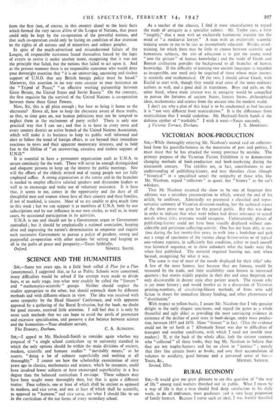Sin,—I appeal to Mr. Heckstall-Smith to consider again whether my
proposal of "a single school curriculum up to university standard in which the only options shouldbe within the main divisions of ancient, modern, scientific and humane studies" "inevitably means," as he asserts, "doing a lot of subjects superficially and nothing at all thoroughly." I cannot see how the scholarship examination of sixty years ago in classics, mathematics and science, which he instances, could have involved fewer subjects or have encouraged superficiality in a less degree than the balanced curriculum I em isage. These subjects may have been taught more thoroughly then, but that is quite a different Matter. Four subjects, one at least of which Shall be ancient as opposed to modern, and vice versa, and one at least of -Which shall be scientific, as opposed to "humane," and vice versa, are 'what I should like to see in the curriculum of the top forms of every secondary school.
As a teacher of the classics, I find it most unsatisfactory to regard the study of antiquity as a specialist subject. • Mr. Taylor says, a little "roughly," that a man with an exclusively humanistic training has the mind of "a mediaeval lawyer." A man with an exclusively scientific training seems to me to be just as incompletely educated. Besides mind- training, for which there may be little to choose between scientific and humanistic subjects, the aim of education is to put the young mind "into the picture" of human knowledge ; and the study of Greek and Roman civilisation provides the background to all branches of human knowledge. If the difficulty of learning two ancient languages is regarded as insuperable, one need only be required of those whose main interest is scientific and mathematical. Of the two, I should advise Greek, with Euclid to start with, though they would read some of the more ordinary authors as well, and a good deal in translation. Boys and girls, on the other hand, whose main interest was in antiquity would be compelled to pursue the fortunes of ancient States, literary forms, philosophical ideas, mathematics and science from the ancient into the modern world.
I don't see why a plan of this kind is to be condemned as bad because it is "not very different from matriculation." It is the differences from matriculation that I would underline. Mr. Heckstall-Smith hands it the dubious epithet of "workable." I wish it were.—Yours sincerely,


































 Previous page
Previous page